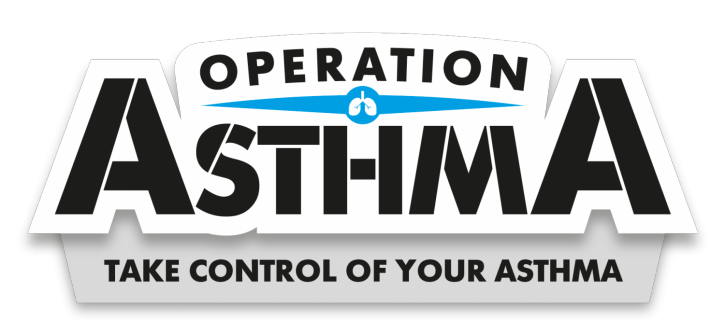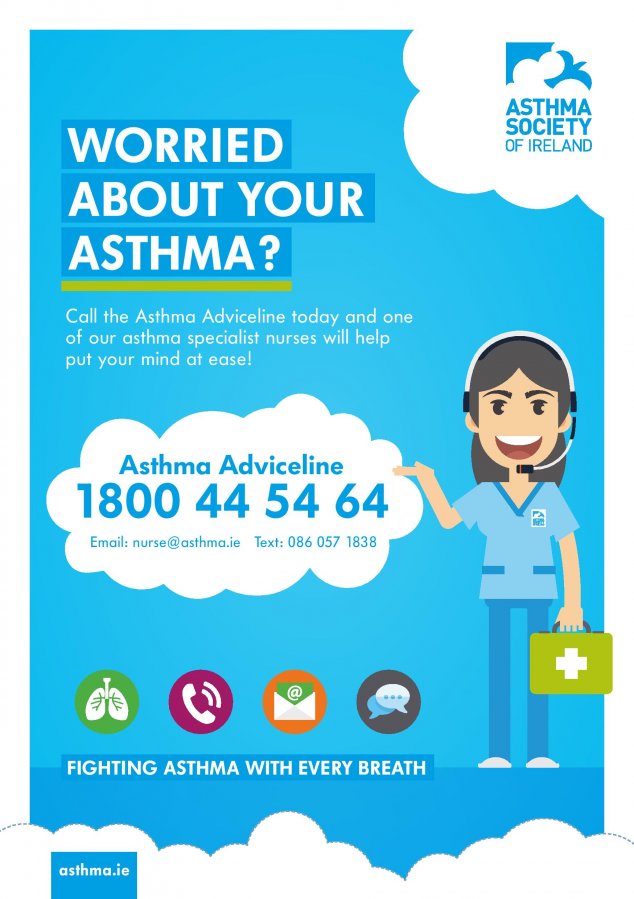
The “Operation Asthma” campaign will help participants by providing them with daily asthma advice, resources and information in areas such as medication adherence, exercising, building an asthma support network, quitting smoking and diet.
#OperationAsthma Day 20: Managing your Hayfever and Asthma1 in 5 Irish people have hayfever (allergic rhinitis). Hayfever can occur all year round or, for some people, only during the summer when certain types of pollen begin to circulate. This can be a major problem for people with asthma, as the symptoms of hayfever (or the substances which trigger it) can also cause a flare-up of asthma symptoms. It is so important if you have asthma to manage your hayfever to avoid having an asthma attack. Some top tips to help you manage your hayfever symptoms:
- Talk to doctor or pharmacist about taking medication to prevent / reduce symptoms. Don't wait until you feel unwell.
- Keep an eye daily on our pollen tracker on asthma.ie which details pollen levels in each of the four provinces in Ireland – It will go live in May 2019
- Keep windows closed in your bedroom at night
- Keep windows and doors closed when the pollen count is high
- Stay indoors as much as possible on high pollen days
- Stay away from grassy areas, especially when grass is freshly cut
- Put Vaseline around your nostrils to trap pollen
- Wear wraparound sunglasses to stop pollen getting into your eyes
- Shower, wash your hair and change your clothes if you have been outside for an extended period
- Avoid drying clothes outdoors, or shake them outdoors before bringing them in
- Minimise your contact with pets who have been outdoors and are likely to be carrying pollen
For more on managing your asthma and hayfever click here
#OperationAsthma Day 19: Speaking to your GP/Consultant
Visiting your GP can be a stressful experience; you’re not feeling well, there may be a waiting list for appointments and it’s often hard to keep track of everything you want to discuss.
Most GP appointments are roughly 10-15 mins in length so it’s easy to miss out on key questions when you’re trying to squeeze everything in. To help you get the most out of your GP visits, we have some top tips on how to prepare for your appointment.
There’s not a lot of time, so write down the one or two really pressing questions you want to ask your GP. This way you can both focus on the key things you’re worrying about.
Bring all your medications with you (including over the counter medications). Inhaler technique is so important in ensuring you’re getting the maximum benefit from your medicines and your doctor will be better able to help you if they can check your technique in person. This also makes sure you’re doctor is aware of everything you’re taking regularly, especially important if you’ve been to different doctors/consultants for different issues.
Don’t be afraid to tell your doctor if you have any issues with the medication you’re taking. This is especially important if these issues have interfered with taking the medication as prescribed. There are many different types of medication and devices available on the market and your doctor will be happy to help you find the one that suits you best. This may involve a bit of trial and error, so it’s important to be completely honest about how you’re getting on!
#OperationAsthma Day 18: The Importance of your Controller Inhaler
Your controller inhaler is one of the most essential tools you can use to get your asthma symptoms under control. Your controller medication reduces the inflammation of the airways over time and lowers the risk of asthma symptoms occurring.
It does not provide any instant relief of symptoms but builds up protection and reduces symptoms over a longer period. With proper use of a controller inhaler, many people will be totally symptom free and need to use their reliever very rarely.
It can take up to two weeks for the effects of controller medication to kick in, or up to 2 months in children. Because of this, it’s important to continue using your controller inhaler as prescribed, even if you feel no immediate improvement. Gradually your symptoms should become less and you will notice that you don’t need to use your reliever inhaler as frequently.
Always use your controller medication as prescribed by your doctor.
To ensure you are using your controller inhaler properly, see our inhaler technique videos: https://www.asthma.ie/about-asth…/…/inhaler-technique-videos
Day 17: Exercises for People with Asthma
Exercise can help improve lung capacity and reduce asthma symptoms. If you are properly controlling your asthma you should be able to participate in whatever sport you enjoy. However, if your asthma is not under control or you are new a sport or haven’t exercised in a while, some sports may be better suited to you. If you have asthma and intend to take up an exercise, you will need to speak to your doctor before doing so.
Exercise that is often suited to people with asthma include: walking and swimming.
Walking is a great way to improve your fitness. Each time you walk you can work on improving your speed and the length you walk – slowly building up your fitness and lung capacity.
Swimming is one of the best exercises for asthma because it strengthens the muscles you use for breathing. The air in the swimming pool is usually moist and warm which is more likely to be favourable to people with asthma. However if you plan to pick up swimming, please be aware that the chlorine used in swimming pools can trigger asthma for some people.
For tips on exercising with asthma see:
Day 16: Feeling Unwell after Quitting Smoking
As we have discussed previously, quitting smoking will have huge health benefits for you, especially if you have asthma.
However, you should note that when you quit smoking you may develop some “quit smoking symptoms”. It is better to know what to expect so you are better prepared to deal with these symptoms.
Cigarette smoke contains nicotine; a powerful addictive substance which is absorbed approximately 8 seconds after smoke is inhaled. Nicotine enters your body and can travel to your brain within 10 seconds. A smoker’s mind and body become addicted and get used of this substance, therefore when you remove this substance after quitting smoking your body and mind need to adjust.
Below are some symptoms that you may experience when you quit smoking:
A dry mouth: This can be irritating but it indicates that the blood supply to the lining of your mouth is improving. A dry mouth after quitting is a result of your body clearing its respiratory tract.
A sore throat and coughing: A sore throat and coughing is a result of your lungs clearing out the mucus that the smoking created.
Digestion: Some smokers after quitting smoking experience a change in their usual bowel movements. For example, some people who quit smoking can experience constipation which can take approximately 2-3 weeks to settle.
You should also note that when you quit smoking your mind will seek the “feel good” effect it used to obtain from smoking. This may sometimes lead you to feel depressed, anxious and easily frustrated, you may also experience problems in concentration and so when you first quit smoking. It can be useful to make a “To Do” list of various things you want to do and achieve to keep you focused on your quitting journey.
Discussed above are just some symptoms you may experience when your body undergoes nicotine withdrawal from quitting smoking , for the majority of people these symptoms will only last a few weeks, however for other people they can last 6 months. The symptoms are usually at their worst at approximately 48 hours after quitting.
However, if you are a smoker, quitting smoking is the best lifestyle choice you can make to improve your health. As we have discussed in previous posts the health benefits are huge, your body’s circulation will improve, poisonous carbon monoxide gases from smoking will be eliminated from your body, your energy levels will increase, your asthma will improve, your risk of a heart attack, stroke and cancers will decrease and these are just a few of the health benefits!
Day 15: Using your Salbutamol (Reliever Inhaler)
Reliever inhalers (usually blue) can be taken as soon as asthma symptoms appear. They work quickly by opening the airways wider and making it easier to breathe again. This is carried out by relaxing the muscles of the airways which tighten when asthma symptoms worsen.
Everyone with asthma should have a reliever inhaler and should keep it with them at all times, as they are essential for treating asthma attacks which may come on suddenly with little warning. You can also take reliever medication before your symptoms get worse, such as when you’re starting to get a cold or before exercise to reduce the risk of symptoms developing.
It's important to note that reliever inhalers don't reduce swelling in the airways and can't help prevent symptoms long term so it is very important you take your preventer inhaler as prescribed.
If you need to use reliever medication more than twice a week it may mean that your asthma is not controlled and you should see your doctor as soon as possible.
To get the most of your inhaler(preventer or reliever) make sure you practice proper inhaler technique. For demonstrations see:
Day 14: Asthma vs Chest Infections
Both asthma and chest infections lead to inflammation in the airways, because of this a chest infection can bring on the familiar symptoms of asthma such as: cough, breathlessness, wheeze and chest tightness. Despite the similarity of the symptoms, a chest infection is very different from asthma and should be treated accordingly.
A chest infection is an acute illness, caused by a bacterial or viral infection. If you have asthma, the added inflammation from a chest infection may make your asthma symptoms worse and you may need to follow your Asthma Action Plan and increase or add-in medication as directed by your doctor.
During a chest infection, the cough is often the last symptom to leave and you may find you’re still coughing a few weeks later. However, if you have asthma and your cough persists even when your chest infection has completely cleared up, it may suggest some inflammation remaining in your lungs and you should arrange to see your doctor as soon as possible so he can review your asthma and adjust your medication if needed.
Additionally, if you haven’t been diagnosed with asthma but have had a cough lasting more than three weeks, it’s a good idea to visits your doctor and discuss your concerns. A persistent cough could be a sign that you have underlying asthma or another lung condition causing your symptoms.
#OperationAsthma Day 13: Getting in Contact with the Asthma Society’s Adviceline.
Our Operation Asthma campaign is all about taking control of your asthma. If you ever need any advice about how to do so, our Asthma Adviceline is a FREE service available to people across Ireland.
The Adviceline allows you to speak to a respiratory specialist nurse who will talk you through a wide range of asthma topics. These include: the basics of asthma, managing your asthma symptoms, what you should do in an asthma attack, asthma and hayfever, asthma in school, asthma and exercise, asthma and diet, asthma and pregnancy, steps to take before and after visiting your GP/Consultant and advice about which asthma and vaccines..
The Adviceline has a proven track record of improving the lives of people with COPD and Asthma. A Survey conducted by the Asthma Society in Aug 2018 revealed that 89% of people agreed or strongly agreed the Adviceline gave them an improved understanding of prescribed medications and when to use them.
The Asthma Adviceline is available on 1800 44 54 64. If you have COPD the number to call is 1800 83 21 46.
We strongly advise people with asthma, weather you are newly diagnosed or have had asthma all your life, to avail of this free service.

Day 12: Speaking to a Respiratory Nurse at one of the Asthma Society's Asthma in the Pharmacy Days.
This new year, you really should look at speaking to a professional about your asthma to ensure you are in control of your condition.
The Asthma Society of Ireland runs a number of Asthma in the Pharmacy days throughout the country. Our asthma nurse specialists are available at these events to provide advice, support and information on asthma. They will be happy to help you to understand and manage your asthma.
For more infomration on Asthma Days upcoming in your area, see: https://www.asthma.ie/events
Day 11: Managing your Asthma during the Winter Months
It is extremley important to manage your asthma, especially in the Winter months. Some top tips on managing your asthma in Winter:
-
Get the flu vaccination. The flu is a very serious, highly contagious, disease, especially for those living with a lung condition. Reduce your risk of contracting the flu by getting vaccinated today.2
-
Reduce your risk of contracting illness. Kindly remind friends and family that even a cold can make your symptoms worse.3 Ask them to wait until they are feeling better before visiting.
-
Wash your hands regularly. Try to avoid coming into contact with harmful bacteria by washing hands, or using hand sanitiser, regularly.4
-
Keep the house warm. It’s important to stay warm during the winter months but make sure your home is well ventilated. If wind and rain triggers your respiratory condition, keep windows closed on particularly bad days.
-
Exercise indoors. Cold and damp air can irritate the airwaves, especially for those living with a respiratory condition such as asthma and COPD.1 Exercising indoors is a great way of improving lung function while also staying warm.6
-
Check the weather forecast. Try to avoid trips outside during particularly cold, wet, and windy weather, which might make breathing more difficult.
-
Wrap up well. If you do plan to go outside during cold weather, wrap a scarf around your nose and mouth. This will both heat and humidify the air, making breathing easier.6
-
Breathe in through your nose. Try to breathe in through your nose, instead of your mouth, this will help to heat the air before it reaches your lungs.1
-
Carry a reliever inhaler with you. Take your prescribed daily medication and have your reliever inhaler with you at all times in case you need it. 7
-
Agree a self-management plan with a healthcare professional. Self-management of symptoms is important, but it’s also important to know who to call and what to do if you are experiencing an attack of symptoms. Agree a self- management plan with your healthcare professional if you don’t already have one in place.
Day 10: The Importance of Using a Spacer with your Inhaler.
A spacer device is a plastic tube device with a mouthpiece or mask at one end, and a space to insert an inhaler at the other. Spacer devices ensure the user gets the maximum benefit from their asthma medication and helps direct it down into the lungs where it's needed.
Spacers are the most effective way for most people with asthma to take their asthma medication. Using a spacer also means there is less risk of side effects from your medication.
Both adults and children with asthma should use spacers with their inhaler device, if the inhaler device is suitable.
For more on spacers see Dr. Eleanor Dunican - consultant respiratory physician at St Vincent’s University Hospital and Associate Professor at the UCD School of Medicine answering some of the most common spacer questions:
Day 9: Knowing your Peak Flow
A peak flow is a measurement of how hard you can blow air out of your lungs. You get this reading by blowing into a small plastic tube called a peak flow meter. Most adults and children over six years of age can use a peak flow meter.
The meter has a marker, which slides up the scale as you blow out. The better controlled your asthma, the harder you'll be able to blow out and the higher your peak flow scores will be.
Your ideal score will vary according to your age, sex and height. Your doctor or nurse will probably ask you to take a series of peak flow reading over a few weeks. You should take readings every morning and early evening, before you use your inhalers. Your doctor or nurse will provided you with a chart to plot the results and he or she will look at them to see if your levels are as high as they should be.
Measuring your Peak Flow is important because: you can tell what's really going on in your airways rather than just guessing, you can find out if the treatment you are on is controlling your asthma and it's a record of how well you've been which you can show your doctor or nurse.
You can purchase a peak flow meter or get a free peak flow diary from the Asthma Society of Ireland by contacting 01 8178886 or email office@asthmasociety.ie.
For more on using your peak flow meter: https://vimeo.com/137614200
Day 8: Controlling your Asthma while returning to College
January sees the return of many students to college after the Christmas break. For students with asthma at any level, it’s important to remember that correct medical management of your condition is critically important and must not be forgotten during this time.
- To better control your asthma while returning to college you should:
- Carry an Asthma Attack Card with you at all times.
- Have an up-to-date Asthma Action Plan.
- Register with the college health centre, let them know you have asthma and ask who can be contacted in case of an emergency.
- Ensure you take your preventer as prescribed and carry your reliever inhaler at all times.
- If living away from home, tell your roommates about your condition and ensure that the accommodation is non-smoking.
- Your college house may not be as clean as you are used to. If sensitive to dust mites, bring your own pillows, allergy-proof covers and a mattress cover.
- Due to the current housing crisis, it is proving increasingly difficult to find college accommodation. Many students will consider living in properties that are unsafe for their health. If you have asthma you need to make sure the accommodation you are living is not damp, and is properly ventilated.
For information on sitting your exams with asthma
Day 6: Smoking Cessation for Quitting Smoking.
Quitting smoking is one of the best lifestyle choices you will ever make. Smoking and asthma are an extremely bad combination. Quitting smoking will help improve your asthma along with your overall health. There are many methods to quitting smoking; one evidence based intervention is smoking cessation which involves a healthcare worker delivering smoking cessation. This includes behavioural change (motivational interviewing) and a recommendation of Nicotine Replacement Therapy.
The framework for smoking cessation consists of 5A’s.
(1) Ask: The healthcare provider will ask you about your smoking. For example you may be asked how much you smoke and about your smoking history. You may also be asked about any failed quit attempts in the past. This will allow your healthcare worker to identify what may have caused the previous attempts to fail so steps can be taken to avoid this problem again.
(2) Advise: The healthcare provider will advise you to quit, advise you of the benefits of quitting smoking and the negative effects of smoking.
(3) Assess: The Healthcare provider will explore your willingness, readiness and confidence to quit. During doing so they will work to identify and explore your motivators and triggers and make an individualised action plan tailored to your needs.
(4) Assist : If you are ready to make a quit attempt the healthcare provider will use behavioural change counselling (motivational interviewing) and Nicotine Replacement Therapy to help you quit.
(5) Arrange-> your healthcare provider will arrange a form of follow up contact with you. This can in person or over the phone & is usually within the first week after the quit date.
No Puff Rule: During smoking cessation sessions you are likely to hear a lot about the “No puff Rule”. This means that once you have quit smoking you need to avoid having even one puff of a cigarette as this one puff could easily get you back smoking - no level of smoke is a safe level.
It is a good idea to reach out to a smoking cessation officer in your area if you are determined to quit smoking.
Click here for an up to date list of smoking cessation officers around the country

Day 5: Signing up for the Asthma Society's E-Learning Programme
January is a great time to set out goals and plan the year ahead, especially when it comes to your career. If you’re a healthcare professional who wants to learn more about asthma and help your patients take control of their condition, our e-learning programme is a great first step!
The e-learning programme covers all aspects of life with asthma and patient care for adults and children, including:
- Module 1: Diagnosis & Assessment of Asthma
- Module 2: Treatment of Asthma
- Module 3: Paediatric Asthma
- Module 4: Guided Self-Management/ Asthma Action Plans
- Module 5: Treatment of Asthma attack
There are assessments and case studies throughout the programme to test your knowledge and ensure you’ve mastered each module before moving on to the next one. The programme was designed in conjunction with the National Clinical Programme for Asthma and is designed to support nurses, pharmacists and all healthcare professionals in treating their asthma patients according to international best practice guidelines.
You can access the e-learning programme on elearning.asthma.ie. For more information please don’t hesitate to get in touch on 01 817 88 86 or by emailing sam.derwin@asthma.ie
#OperationAsthma Day 4 – The Importance of Having an Asthma Action Plan.
Everyone with asthma should have an Asthma Action Plan.
An Asthma Action Plan is a written, step by step guide to help you manage your asthma and recognise when it’s getting worse. Your Asthma Action Plan is filled out with your GP or asthma nurse, who will make sure the plan is completely tailored to you or your child.
A completed Asthma Action Plan will include the following information:
- A list of your medication and when to take it (even when you're feeling well)
- Information on how to care for your asthma when you’re feeling well , slightly symptomatic and even uncontrolled.
- How to tell if your asthma is getting worse
- What to do if your asthma symptoms keep getting worse
- What to do if you have an asthma attack (The 5 Step Rule)
- Any important contact information like your GP or emergency contacts.
Having a written Asthma Action Plan can help you to: reduce your chance of needing to urgently visit your doctor or the hospital, improve your lung function and reduce the number of days off work or school which are taken because of asthma.
To download your free asthma action plan: https://bit.ly/2VwoenI
Day 3: Giving Up Smoking
At least 75% of people with asthma become wheezy in a smoky room. It has been shown that children with asthma whose parents smoke have more asthma episodes than children whose parents don't smoke.
- If you smoke or are exposed to passive smoke you increase the risk of asthma attack and may permanently damage your airways.
- If you smoke as a teenager you increase the risk of your asthma persisting
- You put your children at risk of asthma if you smoke around them or during pregnancy
- You also increase the risk of developing Chronic Obstructive Pulmonary Disease (COPD).
For help quitting smoking, the @hseQuit ‘s online Quit Plan will support you in doing so.
Sign up for the plan to get free help and support to stop smoking.
Signing up will get you:
- daily email and text support
- a personalised web page to track your progress
- one-to-one support from a trained stop smoking advisor
- tips from people who have stopped smoking

Day 2: Stress and Asthma
Living with a chronic condition like asthma can be a stressful experience, but did you know that stress could be making your asthma worse?
For some people with asthma, strong emotions and stress can act as a trigger for their asthma symptoms. This could be a single intense emotional response or a slow build up over a long time. Either way, it can be difficult to pinpoint the part your emotions play in your asthma. However, if you feel that your emotions aren’t well-balanced then they may be making your asthma worse and causing symptoms such as cough, chest tightness, wheeze and breathlessness. You may need to use your reliever inhaler more often, or even experience an asthma attack. If an attack occurs, it is extremely important to see your healthcare professional as soon as you can.
There are a variety of supports and resources available to help you cope, from stress management strategies to relaxation techniques and meditation apps. Counselling services may also be something to think about, particularly if you are dealing with a bereavement or other major life changes.
If you feel that your emotions may be affecting your asthma, speak to your doctor about the best course of action for you. Living with uncontrolled asthma can be a major source of stress but luckily, there are plenty of options available to get you back on track. Keeping an eye on your condition, working with your healthcare professional and consistently taking your medication as prescribed will all help to minimise your symptoms and hopefully, ease your worries
Day 1: How to Exercise with Asthma
Hi all. To start off our Operation Asthma campaign we’ll be first looking at exercising with asthma. New years resolutions make January an extremely important month for people to work on their fitness. Having asthma doesn’t have to limit your ability to enjoy or excel at sport and exercise. Regular exercise is an important part of a healthy lifestyle for everyone, but especially for people with asthma. In fact, research has shown that a structured exercise regime can improve lung function and can be a key part of good asthma control.
Top Tips for Exercising with Asthma:
Maintain good asthma control by: taking asthma medication as prescribed, managing your asthma triggers and developing an asthma management plan with your healthcare professional.
Always warm up gently for approximately 15 minutes before more vigorous exercising and cool down afterwards. This helps your body and in particular, your lungs, to get ready for the upcoming, more strenuous exercise.
Always have a reliever inhaler (usually blue) with you when you exercise: if your asthma is triggered during exercise take your reliever inhaler approximately 15 minutes before warming up. (2 puffs of a Metered Dose Inhaler or one puff from a Discus or Turbohaler)
Tell people you have asthma: if you are exercising alone, make sure someone knows where you are and what time you are due to return, make sure that your coach and the people you exercise with know you have asthma.
If your asthma is triggered by pollen, you may wish to: check the pollen forecast at www.asthma.ie, avoid exercising outside when the pollen count is high, make sure you are taking the right medication to manage your hay fever as well as your asthma.
If you have asthma symptoms during exercise: STOP, take your reliever medication and wait 5 minutes until you can breath easily and are symptom free before starting again.
The Asthma Society’s 'Reach Your Peak with Asthma booklet' is designed to help people with asthma enjoy exercise and get the most out of the sports they play.
#OperationAsthma Day 21: Kids Symptom Diary
As part of our Operation Asthma campaign we are delighted to release our new Symptom Diary.
The Symptom Diary allows children (and indeed adults) to track their asthma symptoms and the medication taken they have taken on a daily basis. Parents should monitor their child’s Symptom Diary and speak to a healthcare professional if they notice anything that would suggest their child’s asthma is not under control, such as needing to use their reliever inhaler more than twice a week.
The Symptom Diary should also be brought along to any appointments the child undertakes as it will allow healthcare professionals to see exactly what has been happening with the child and allow them to know if their asthma treatment needs altering.
The diary is designed so that it used over 6 weeks but it allows the user to fill in the date so each week is recognisable.
To download a FREE Symptom Diary click here:




